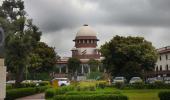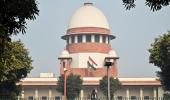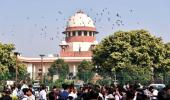From demonetisation to sub-categorisation of Scheduled Castes to bulldozers, Justice Gavai has been part of several judgments.

“I am here only because of Dr B R Ambedkar and the Constitution of India.” For Justice Bhushan Ramkrishna Gavai, who will take over as chief justice of India (CJI), Bhim Rao Ambedkar, one of the founding fathers of the Constitution of India, is much more than a guiding light.
Born on November 24, 1960, to Ramkrishna Suryabhan Gavai, who was active in Maharashtra politics and had worked closely with Ambedkar, he started as an advocate at 25.
He began his career with the late Raja S Bhonsale, former advocate general and judge of the Bombay high court. Then he forked out on his own and started independent practice at the Bombay high court till 1990, after which he practised mainly before the Nagpur bench of the court.
Well versed in constitutional and administrative law, Justice Gavai was standing counsel for the Municipal Corporation of Nagpur, Amravati Municipal Corporation, and Amravati University. He appeared regularly for autonomous bodies and corporations and municipal councils in the Vidarbha region.
In addition to this, he was assistant government pleader and additional public prosecutor at the Nagpur bench of the Bombay high court from August 1992 to July 1993, before becoming government pleader and public prosecutor.
He was appointed judge at the Bombay high court on November 14, 2003, and served there for 16 years before being elevated to the Supreme Court on May 24, 2019.
Justice Gavai is on the path to becoming the second Scheduled Caste CJI. Justice K G Balakrishnan, who retired in 2010, was the first.
He will be CJI from May 14 to November 24.
“Though I did not work with him, I think he will be a good CJI. The only problem is that his tenure is too short. The lawyers practising before the Supreme Court are happy, I hear,” Justice Balakrishnan said.
Several lawyers and former judges expect him to be crucial in furthering the discipline and functioning of the Supreme Court. Former Justice Sanjay Kishan Kaul said Justice Gavai was expected to provide a channel to the government in judicial appointments.
“I think he will be able to help with pending appointments in high courts,” he said.
At the Supreme Court, Justice Gavai has been part of several judgments. In January 2023, he was part of the majority verdict that upheld the Centre’s demonetisation decision in 2016.
In his opinion concurring with the judgment on August 1, 2024, allowing sub-categories among Scheduled Castes, Justice Gavai advocated extending the creamy layer principle to Scheduled Castes and Scheduled Tribes to achieve “real equality”.
“The State must evolve a policy for identifying the creamy layer even from the Scheduled Castes and Scheduled Tribes so as to exclude them from the benefit of affirmative action. In my view, only this can achieve the real equality as enshrined under the Constitution,” Justice Gavai had then said.
He was also part of a five-judge Constitution Bench that upheld the Centre’s decision to abrogate Article 370, which gave special status to the erstwhile state of Jammu and Kashmir.
“He has always been a pleasure to appear before and watch as he conducts his court, always fair and relief-oriented. There is constant banter in his court between the bench and the bar, with his quick wit mostly keeping the gallery in awe,” said Raunak Dhillon, partner, Cyril Amarchand Mangaldas.
In November last year, a two-judge bench presided over by Justice Gavai criticised the use of bulldozers against properties of the crime accused, and ruled that demolishing properties of citizens without following due process was contrary to the rule of law.
“Justice B R Gavai stands out as a jurist who blends constitutional fidelity with social sensitivity. His judgments are fair with clarity and guided by an unwavering commitment to the constitution,” said Alay Razvi, managing partner, Accord Juris. Some feel Justice Gavai is likely to work on improving the judicial and registrar court discipline of the top court.
He has expressed significant discontent with the Supreme Court’s current state of discipline, stating that it was the “most undisciplined” courtroom he has ever seen. “Discipline and decorum are the fundamental ethos of the legal profession. Coupled with judges’ fervour of conducting themselves with a firm hand, it will be a welcome sight to see the nobility of the profession being taken to new heights,” said Shiv Sapra, partner, Kochhar & Co.











